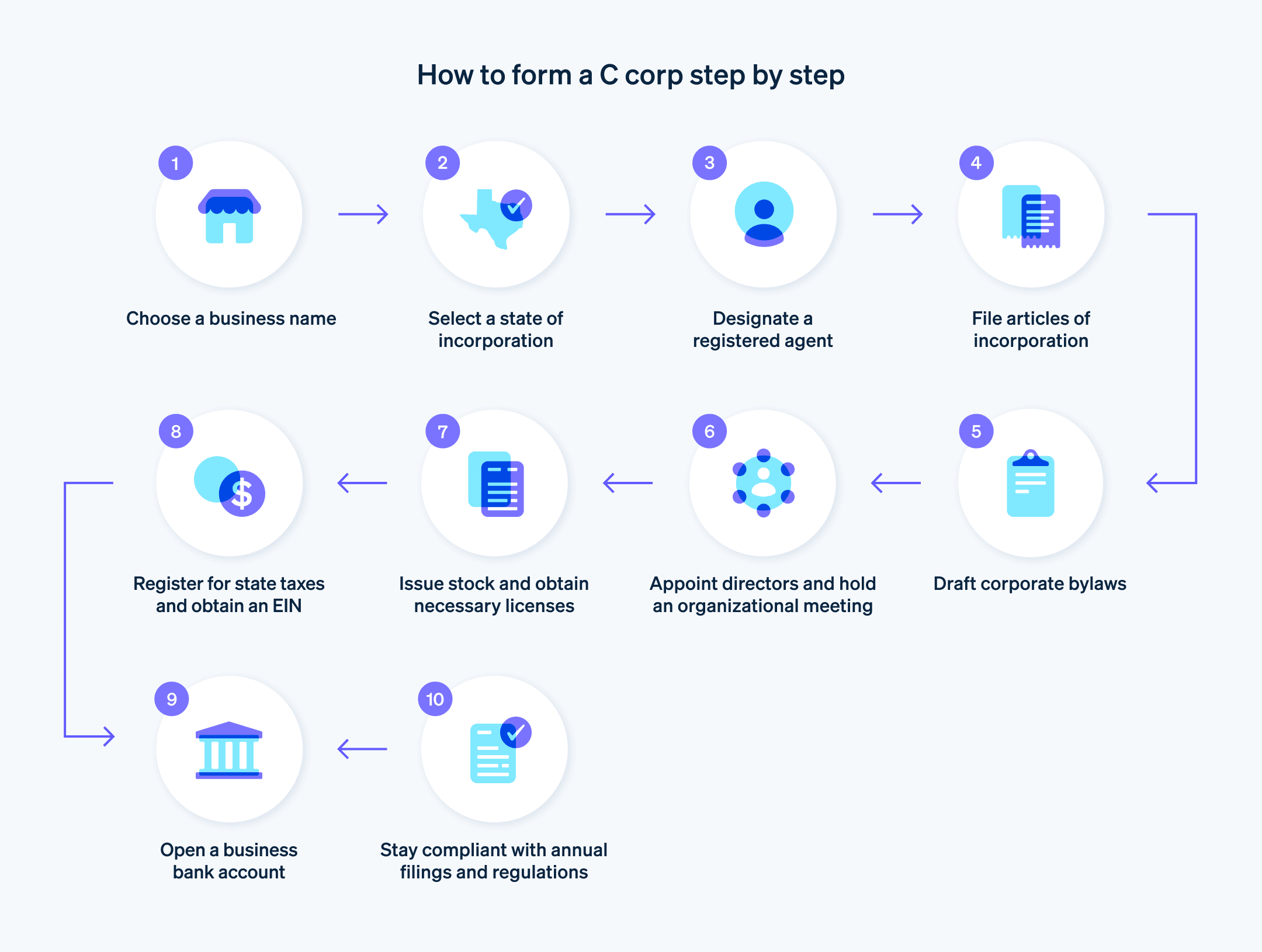C 类公司 (C corp) 仍然是美国最常见的公司结构之一。仅在 2023 年 9 月,美国人口普查局就报告了近 473,000 份新的商业申请,而在这 3.2 万份左右将完全成立的公司实体中,许多都将成为 C 类公司。尽管组建 C 类公司的动机很明确 — 利用增长机会并为企业的成功奠定基础 — 但组建 C 类公司的过程更加不透明。
下面,我们将解读组建 C 类公司的关键步骤。如果您正在考虑这种公司结构,以下是您需要了解的有关其属性和好处的信息,以及如何使其成为您企业的法律框架。
目录
- 什么是 C 类公司?
- C 类公司的主要属性
- 组建 C 类公司的好处
- 如何组建 C 类公司
- Stripe 能提供什么帮助
什么是 C 类公司?
C 类公司是一种根据州法律成立的商业实体,将企业与其所有者或股东区分开来。作为一家 C 类公司,企业赚钱并按公司税率纳税,而股东只负责为其投资纳税,这使他们免受直接的公司责任。
C 类企业的主要属性
与其他公司结构一样,C 类公司由其独特的属性和对企业的影响来定义,在评估 C 类公司是否是最适合您企业的公司结构时,了解这一点很重要。以下是 C 类公司结构对企业的意义:
独立法人实体:C 类公司作为一个独立的实体运营,不同于其所有者或股东。
有限责任:股东的财务责任仅限于他们的投资,这可以保护个人资产免受企业债务的影响。
双重征税:公司对其利润纳税。当这些利润作为股息分配时,股东就要为他们的个人回报纳税。
股东结构:C 类公司可以拥有无限数量的股东,股票可以公开交易。
永久存在:即使所有者或股东发生变化或死亡,公司也将继续存在。
管理结构:股东选举董事会,董事会又任命官员管理日常运营。
组建 C 类公司的好处
选择公司实体是企业可以做出的最具影响力的决策之一,因为该结构直接影响增长潜力、税收影响和利益相关者关系。C 类公司是各行各业企业的热门选择,尤其是那些希望扩大规模或寻求外部投资的企业。以下是选择注册为 C 类公司带来的一些好处:
有限责任保护:股东在个人资产和企业债务之间有一道保护屏障。这种保护可以在面对诉讼或企业面临财务挑战时让您高枕无忧。
通过股票发行实现增长潜力:C 类公司可以发行不同类别的股票,这使他们能够从投资者那里筹集资金。这对风险投资家和私募股权投资者特别有吸引力。
无股东限制:与其他商业实体不同,C 类公司对他们可以拥有的股东数量没有限制。此功能对于正在考虑上市的公司来说可能很重要。
通过股票期权吸引人才:提供股票期权或股票可以成为吸引和留住一流人才的有力激励措施,尤其是对于技术专业人才竞争激烈的行业。
永久存在:无论股东如何变化,C 类公司都能保持业务连续性,这对长期规划非常有利。
留存收益的税收灵活性:虽然双重征税通常被视为一种弊端,但 C 类公司可以选择保留收益并将其再投资于企业,这有时可以降低实际税率。
C 类公司集财务灵活性、增长机会和抵御某些风险于一身,非常吸引人。对于那些考虑大幅扩张的企业或那些希望尽可能吸引投资者的企业来说,C 类公司是一个令人信服的选择。一旦您根据自己的目标和优先事项确定 C 类公司是对您的企业最有利的选择,就可以开始将您的企业注册为 C 类公司了。
如何组建 C 类公司
成立 C 类公司是一个结构化的过程,需要尽职、有条理以及对州和联邦要求的深刻理解。有时看起来可能很繁琐,但如果不遵守适当的协议,只会使过程更加复杂。下面简述了组建 C 类公司所涉及的步骤:
1.选择企业名称
组建 C 类公司从选择企业名称。该名称必须将公司与在公司注册州注册的其他实体区分开来。大多数州还将对在名称中包含特定名称做出规定,例如“公司”、“注册”、“有限公司”或这些术语的缩写,表明企业作为公司实体的正式地位。
2.选择公司注册州
决定在哪里注册至关重要。虽然许多企业出于方便和熟悉的考虑,会选择其总部所在的州,但也有一些企业倾向于选择某些以良好商业环境而闻名的州。例如,特拉华州 因其先进灵活的公司法而备受青睐,而内华达州则在税收结构方面具有优势。加利福尼亚州也是另一个热门选择。
3.指定注册代理人
每家 C 类公司都需要一个注册代理人,即负责接收法律文件的个人或实体,包括与诉讼相关的文件或国家公文。代理人必须在公司所在州有实际地址,并在正常营业时间内在公司接收和回复官方通知。
4.提交公司章程
这份基础性文件包括企业名称、地址、指定注册代理人、拟发行股票的性质和数量等基本细节。企业必须向州务卿办公室或类似的管理机构提交公司章程,并支付备案费,以正式确定公司地位。
5.公司章程草案
章程是公司的内部规则手册。它们规定了运营程序,划定了股东、高级职员和董事的权利和义务,并制定了企业的管理框架。保持详细、清晰的公司章程对于提高透明度和解决冲突非常重要。
6.委任董事
董事在指导公司发展和做出重大决策方面起着关键作用。最初,公司注册人或参与组建公司的一群人通常会任命董事。通常情况下,这些最初任命的董事会留任至公司首次正式股东大会召开,届时股东将选举董事会。
7.召开组织会议
首次会议是公司活动的启动平台。在此,董事们通过之前起草的公司章程,任命公司管理人员管理日常运营,并处理其他相关的启动事宜,同时做好详细的会议记录。
8.发行股票
C 类公司发行股票以筹集资金并提供所有权股份。这些在公司章程中定义的股票将分配给初始股东,作为他们在公司中所有权的证明。
9.申请执照和许可证
企业的性质和位置决定了它所需的执照和许可证。从城市营业执照到专业许可证,这些法律文件授权公司在其行业和地区内运营。
10.登记州税
纳税义务因州而异。如果国家征收销售税,并且公司经营应税商品或服务,则必须获得销售税许可证才能向客户征税。
11.获取雇主识别号 (EIN)
EIN 通常被比作企业的社会安全号,是美国国税局颁发的联邦税号。该号码是许多商业活动(从雇用员工到提交联邦报税表)的先决条件。
12.开立商业银行账户
将个人和企业资金结合起来可能是一个严重的错误,有可能破坏公司提供的有限责任保护。开立专用商业银行账户 是保持清晰财务界限的关键。
13.保持合规
组建 C 类公司只是企业旅程的开始。为了保持其地位,公司必须始终遵守州政府的规定。这包括保持更新的公司记录,召开和记录年度会议,并确保所有执照和许可证保持最新状态。

Stripe 能提供什么帮助
Stripe Atlas 使公司设立工作变得简单,让您可以尽快向客户收款、聘请团队和筹集资金。
在 Stripe Atlas 中填写公司详情(用时不会超过 10 分钟)。然后,我们将为您在特拉华州注册公司,为您获取美国国税局税号 (EIN),帮您一键购买新公司股份,并自动提交您的 83(b) tax election。Atlas 提供多种合同和招聘法律模板,还可以帮助您开立银行账户,甚至让您在国税局给您分配税号之前就开始接受付款。
Atlas 创始人还可以获得领先软件合作伙伴的独家折扣、精选合作伙伴那里的一键入驻以及免费的 Stripe 支付处理积分。立即创办公司。
Stripe Atlas 申请
只需不到 10 分钟就可以填写好您新的公司详情。选择公司结构(C 类公司、有限责任公司或子公司)和企业名称。使用我们的即时公司查名工具,在提交申请之前确认其是否可用。您最多可以额外添加四个联合创始人,决定其股权分配方式,并为未来的团队成员保留股权池(如果愿意)。您将任命官员,添加地址和电话号码(如果需要的话,创始人有资格获得一年期的免费虚拟地址),并一键查看和签署您的法律文件。
在特拉华州设立公司
Atlas 将在一个工作日内审核您的申请并在特拉华州提交您的公司设立文件。所有 Atlas 申请都包括该州的 24 小时快速处理服务,不额外收取费用。Atlas 收取公司注册费用和首年注册代理服务费共计 500 美元(州的合规要求),此后每年收取 100 美元的注册代理维护费。
获取国税局税号 (EIN)
您在特拉华州设立公司后,Atlas 将为您的公司申请美国国税局税号。提供美国社会安全号码、美国地址和美国电话的创始人有资格获得加急处理;所有其他用户为标准受理方式。对于标准订单,Atlas 会致电美国国税局为您检索 EIN,使用国税局的实时数据来确定何时可为您完成申报。您可以详细了解 Atlas 如何检索您的 EIN 并查看当前税号 ETA。
购买公司股份
Atlas 成立公司后,我们会自动向创始人发行股份,并帮助您进行购买,如此您便正式拥有了公司的股份。Atlas 允许创始人一键购买他们拥有知识产权的股份,并在您的公司文件中予以反映,因此您不需要邮寄和跟踪现金或检查付款。
提交您的 83(b) tax election
许多初创公司创始人选择提交 83(b) tax election,以便未来可能节省个人税。Atlas 可以为美国和非美国创始人一键提交和邮寄您的 83(b) tax election——无需前往邮局。我们将使用带有跟踪功能的 USPS 认证邮件对其进行归档,您可以在管理平台中获得您签署的 83(b) election 和归档证明的副本。
合作伙伴津贴和折扣
Atlas 与一系列第三方工具合作,为 Atlas 创始人提供特殊定价或访问权限。我们在工程、税务和财务、合规和运营工具方面提供折扣,包括 OpenAI 和 Amazon Web Services。Atlas 还与 Mercury、Carta 和 AngelList 合作,使用您的 Atlas 公司信息提供更快的自动入驻服务,让您可以更快地做好银行开户和融资准备。Atlas 创始人还可以获得其他 Stripe 产品的折扣,包括长达一年的支付处理免费积分。
阅读我们的 Atlas 初创企业创始人指南,或了解有关 Stripe Atlas 的更多信息,以及它如何帮助您快速轻松地建立新业务。立即创办公司。
本文中的内容仅供一般信息和教育目的,不应被解释为法律或税务建议。Stripe 不保证或担保文章中信息的准确性、完整性、充分性或时效性。您应该寻求在您的司法管辖区获得执业许可的合格律师或会计师的建议,以就您的特定情况提供建议。